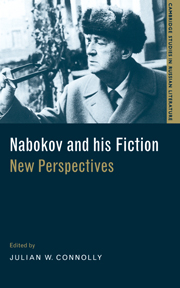Book contents
- Frontmatter
- Contents
- A note on the contributors
- A note on transliteration
- A note on abbreviations
- Acknowledgments
- Introduction: Nabokov at 100
- PART 1 ARTISTIC STRATEGIES AND THEMES
- PART 2 LITERARY AND CULTURAL CONTEXTS
- 7 Nabokov's (re)visions of Dostoevsky
- 8 Her monster, his nymphet: Nabokov and Mary Shelley
- 9 Vladimir Nabokov and Rupert Brooke
- 10 Clio laughs last: Nabokov's answer to historicism
- 11 Poshlust, culture criticism, Adorno, and Malraux
- Selected bibliography
- Index
- CAMBRIDGE STUDIES IN RUSSIAN LITERATURE
8 - Her monster, his nymphet: Nabokov and Mary Shelley
Published online by Cambridge University Press: 18 December 2009
- Frontmatter
- Contents
- A note on the contributors
- A note on transliteration
- A note on abbreviations
- Acknowledgments
- Introduction: Nabokov at 100
- PART 1 ARTISTIC STRATEGIES AND THEMES
- PART 2 LITERARY AND CULTURAL CONTEXTS
- 7 Nabokov's (re)visions of Dostoevsky
- 8 Her monster, his nymphet: Nabokov and Mary Shelley
- 9 Vladimir Nabokov and Rupert Brooke
- 10 Clio laughs last: Nabokov's answer to historicism
- 11 Poshlust, culture criticism, Adorno, and Malraux
- Selected bibliography
- Index
- CAMBRIDGE STUDIES IN RUSSIAN LITERATURE
Summary
Knowledge of Nabokov's privileged background has tended to confirm, for many readers over the past half-century, their wary impression of his fiction: that it is crafted by a “virtuoso stylist” coolly presiding over his universe and serenely, even cruelly indifferent to the plight of his characters. To this familiar stereotype has been added, in recent years, the stigma of male chauvinism: Nabokov, we often hear it said, was a patriarch par excellence. The novelist's most widely read novel, Lolita, has only intensified the charges against him – inciting more than a few critics to label its author not just a sexist but a sexual pervert. The man who invented Humbert Humbert proved himself capable, after all, of fantasizing the most salacious, brutally oppressive conduct known to the male gender. For nearly three hundred pages the author lays out in rich, provocative detail the protracted sexual and social exploitation of a female – a helpless child, at that – by a pedophile who pretends to be her father. How far can the novelist's own perspective (and proclivities) lie, these critics ask, from his scurrilous narrator's?
Convinced that “most of the sympathies in the story” lie with Humbert Humbert, Naomi Wolf objects to the fact that in Lolita, “great art” makes the child's sexual exploitation seem, “if not good, then at least completely understandable.” Most troubling of all, it appears, is the way that the novelist extends his guilt-by-association-with-Humbert to Lolita's readers. Invited to imagine (and thus to “understand”) the nature of Humbert's desire, we come dangerously close, Wolf implies, to approving his actions: to regarding them as “good.”
- Type
- Chapter
- Information
- Nabokov and his FictionNew Perspectives, pp. 158 - 176Publisher: Cambridge University PressPrint publication year: 1999

